Recap: why exploring Wordle answer #265, Mar 11 was so tricky
Today's Wordle answer is catching everyone out
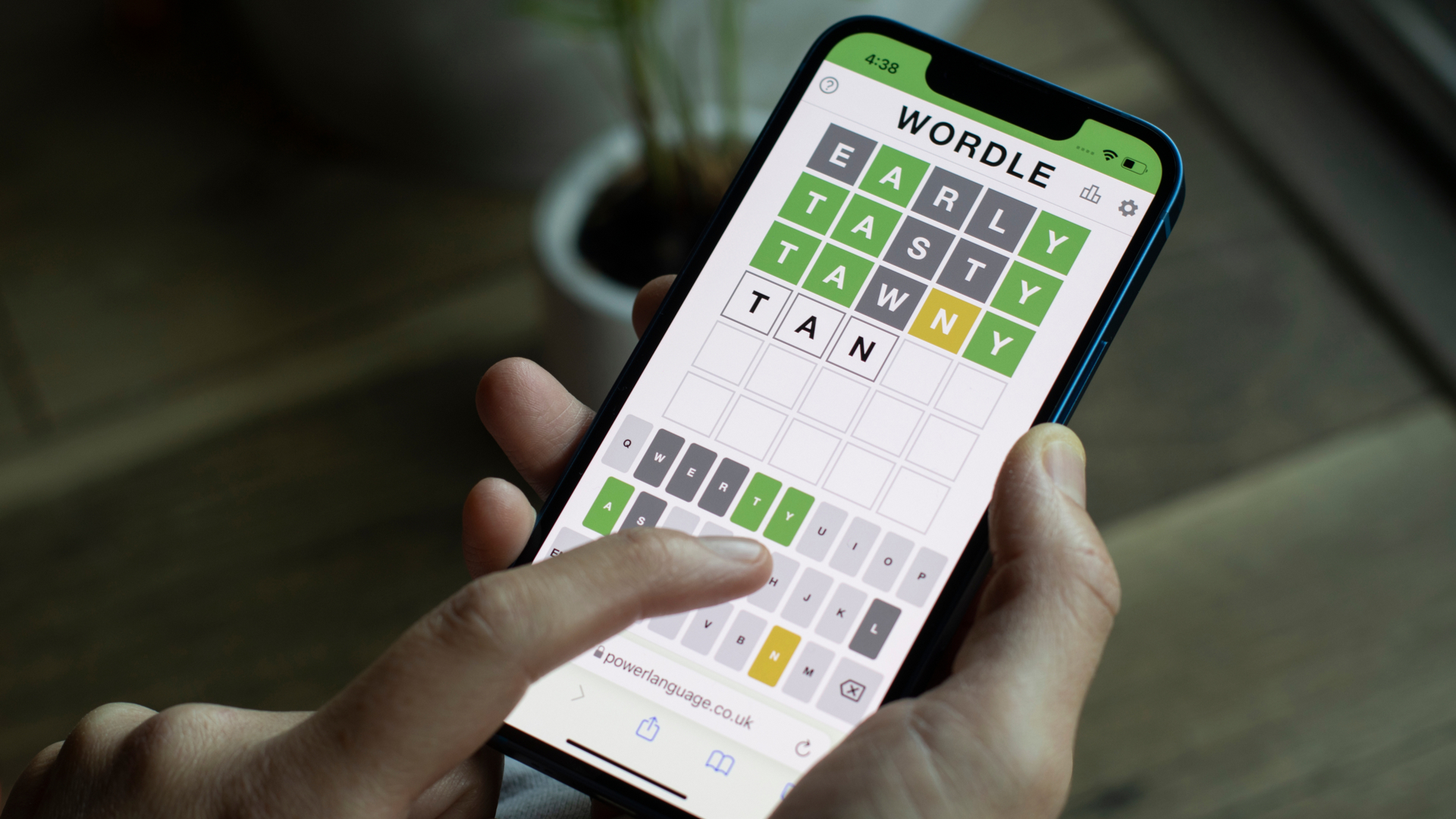
This piece discusses puzzle #265 from Friday, March 11. If you're looking for the answer to puzzle #266, head on over to our page discussing today's Wordle answer to get the inside scoop.
Puzzle #265 was one of the trickiest we've ever seen, with hundreds, if not thousands of people getting caught in the same loop that I did. Obvious spoiler warning - we're going to be discussing the solution to puzzle #265 here, so don't go any further if you don't want to see it.
This live blog has been running for hours now, and is absolutely my own catharsis about failing so hard at 12:30AM, and me needing to share the disappointment with you - and we’re leaving it live so you can recap what’s been uncovered.
We've spoken to linguistics experts, the editors of Wordle solving sites, polled our readers - and we've come up with some pretty helpful hints from them:
- The bigger picture: Take a step back every time you get a letter pattern and think less about how often letters are used, but what word they could be used to make. Popular or less popular letters are irrelevant - it's about the popularity of combinations.
- Think building blocks: More important than single letters are 'bigrams', or groups of two letters. For this, it was AT and CH, but if you've got _A_C_ in a puzzle, think what letters could join them to skip ahead a few answers.
- Make it easier: If you're not using Hard Mode, consider a 'sacrificial word'. Try a word that uses more consonants to fill in that last letter by simply eliminating some options, so instead of trying 'catch' try clamp, which would hit catch, latch, match, and patch together, eliminating many of those.

As I've said above, while this live blog is designed primarily to help you, I also want to use it as a way to get around the deep frustration at today's answer. I'll be looking through the reactions online, offering up hints to help you, pulling in information from around the web and sharing some of our top articles to help you try other things in the meantime.
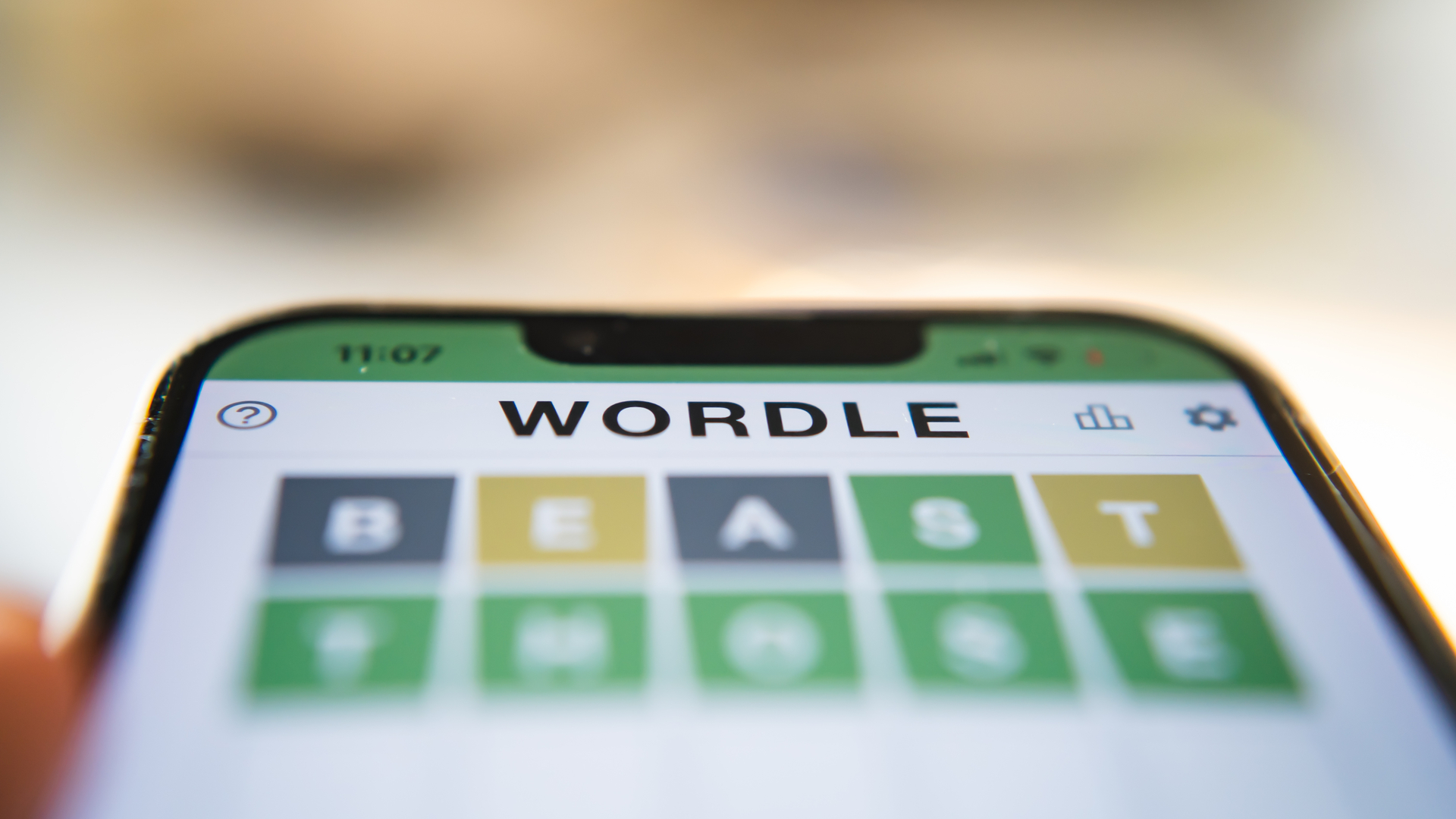
Let me take you through the issues that I faced last night - the high of feeling so smug that I worked out that the word likely ended in _ATCH, following my logical steps from my first word DANCE.
I figured out the combo at the end. I realized a vowel couldn't live after the A. I had a great shot at doing it in two, but dang it, that wasn't the right answer. Surely I'd do it on the next attempt, right...?
If you're on Twitter today, the top trending term today is 'Wordle 265 X' - which tells you the story that you need to know.
Let's take a look at some of the top bits of 'feedback' for the situation today:
Wordle games like today's make me realise there are two types of players:1.⬜⬜⬜🟨⬜⬜🟨🟨⬜⬜⬜🟩🟩🟩🟩⬜🟩🟩🟩🟩⬜🟩🟩🟩🟩⬜🟩🟩🟩🟩2.⬜⬜⬜🟨⬜⬜🟨🟨⬜⬜⬜🟩🟩🟩🟩⬜⬜⬜🟨⬜🟩🟩🟩🟩🟩#dailywordleclub #Wordle265 Wordle 265 XMarch 10, 2022
Wordle 265 X/6⬛⬛⬛⬛🟩⬛🟩🟩🟩🟩⬛🟩🟩🟩🟩⬛🟩🟩🟩🟩⬛🟩🟩🟩🟩⬛🟩🟩🟩🟩I’m fine I’m fine I’m fine I’m fine I’m fine I’m fine I’m fine I’m fine I’m fine I’m fine I’m fine I’m fine I’m fine I’m fine I’m fine I’m fine I’m fine I’m fine I’m fine I’m fineMarch 11, 2022
I've never been betrayed more by a game in my life Wordle 265 X/6⬛🟩🟩🟩🟩⬛🟩🟩🟩🟩⬛🟩🟩🟩🟩⬛🟩🟩🟩🟩⬛🟩🟩🟩🟩⬛🟩🟩🟩🟩March 10, 2022
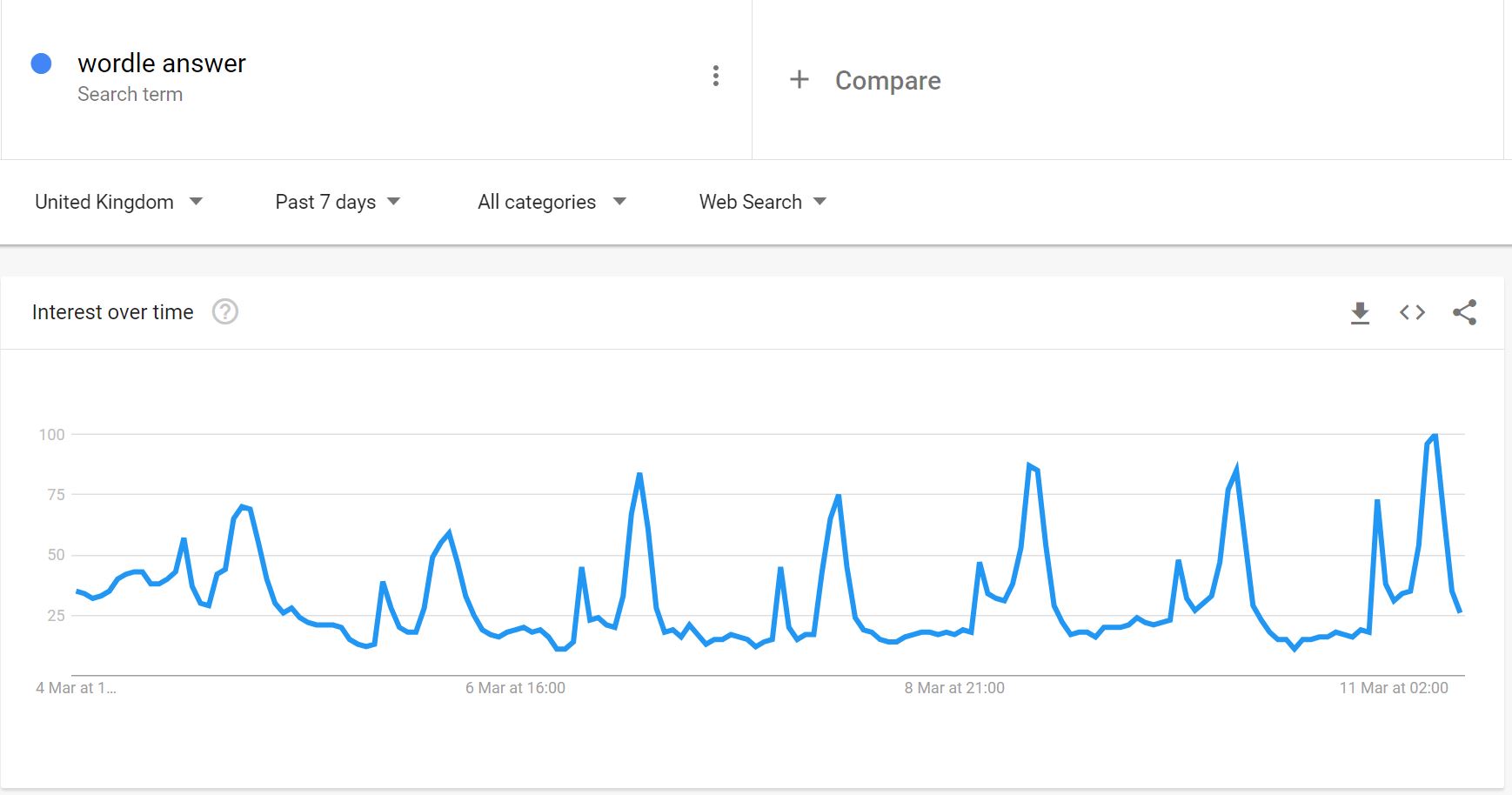
Here's something interesting already: Google Trends for the UK suggests that this isn't the huge fail that many people are reporting on Twitter - it seems that the outrage on the social media platform is far greater than Google Trends' information is pointing out.
But let's dig a little deeper here - we know the answer ends in _ATCH, and - like me - I'm sure many people are thinking: 'I don't need to Google the answer, right? Surely it's the next one?'
And then, like me, they throw in LATCH and watch as their streak disappears in smoke.
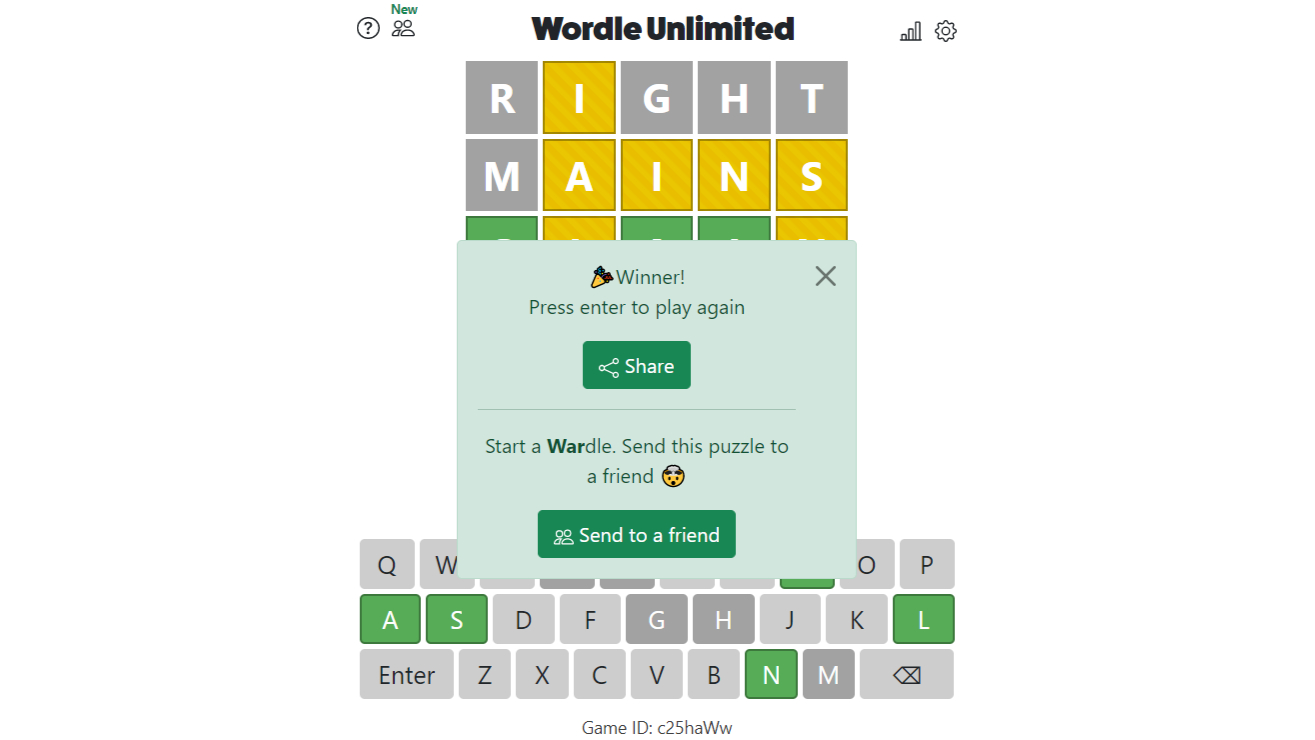
While I have you, let's talk about some other alternatives to Wordle you might like to try - the one that gets a lot of people talking is Wordle Unlimited.
It's a (clearly unofficial) version of the game that allows you to do lots of things that the normal game prohibits - the main one being being able to play again, and again, and again.
You can set the word length (don't do it more than eight if you want to still have your fingernails by the fifth guess), and set custom Wordle challenges with friends.
It's a good, and diverting, way to keep playing - although it does somewhat strip the purity of the daily puzzle.
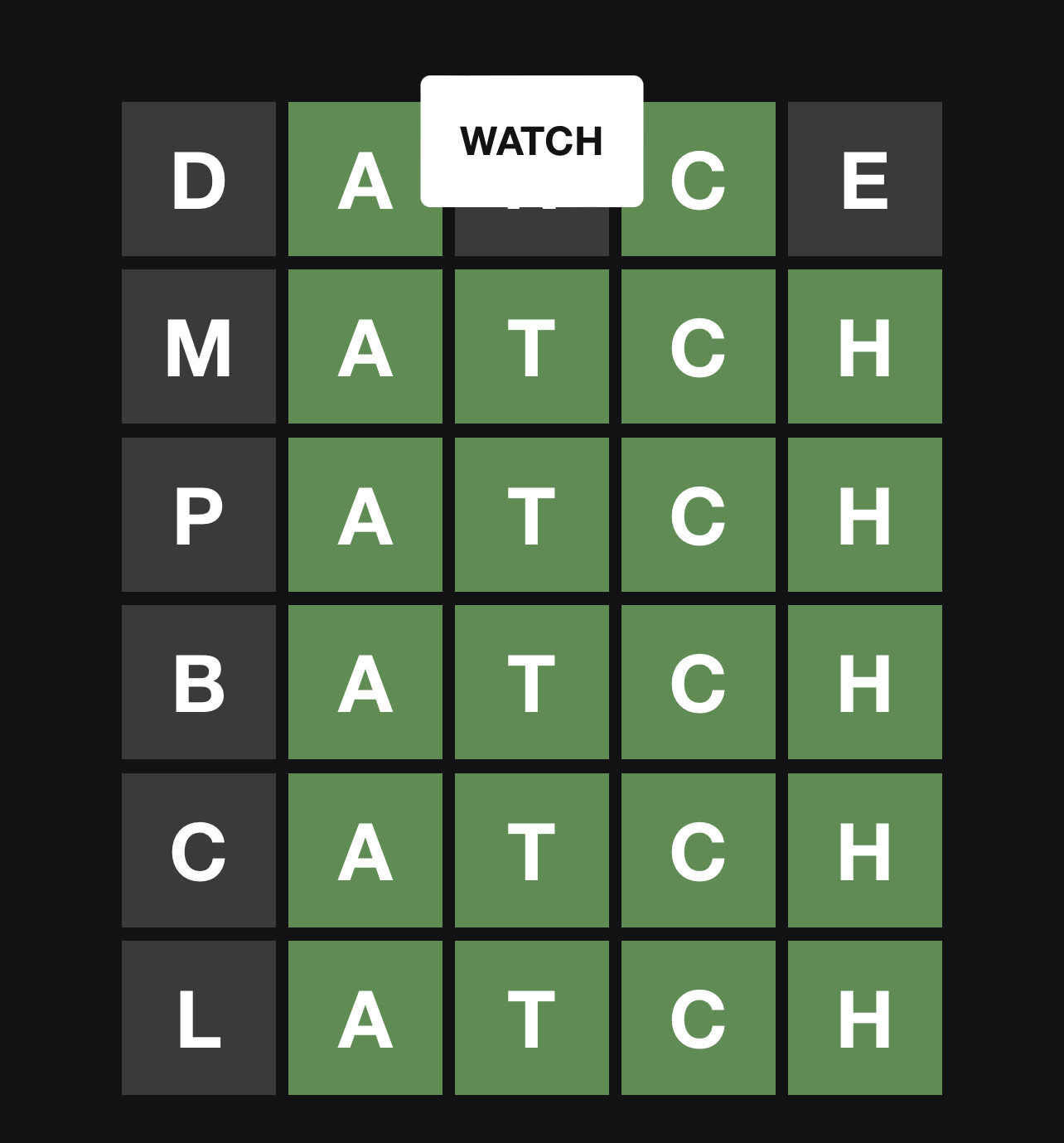
OK, I've been doing some research, and using a couple of tools - I can see that I just made a huge mistake and should have been far more thoughtful in the answer.
So, you can see that I got caught on the _ATCH train pretty early on. And my brain did what I expect many people's would: think of letters that could go onto the front of that.
A quick look at letter prominence in dictionaries tells us this: that W only appears 0.91% of the time.
Compare that to M (3.2%), P (2.8%), B (2%), C (4%) and L (5.3%), it makes sense that one would disregard W, especially as the word WATCH is pronounced WOTCH, so mentally that wouldn't have flared up as an option either.
But there's the mistake, and one that I'll try hard with in the future: when I cross-referenced this data with the Corpus of Contemporary American English's database of word frequency in text, WATCH is the most popular, appearing 318,000 times.
Compare that to CATCH (160,000 times) or MATCH (44,000 times), or even HATCH (5,000 times) I chose really poorly.
I know that the NY Times doesn't do things on popularity necessarily, but's it openly said that obscure words aren't going to be in there - so it makes sense to go popular first.
Gareth's new hint: Take a step back every time you get a letter pattern and think less about how often letters are used, but what word they could be used to make. It's going to mean that next time, I don't make this mistake.

One of the other interesting things about Wordle is that, while it's English language, the way those words are used and interpreted varies dramatically across the globe.
With the US audience starting to wake up now, the question is: will they'll be more, or less, likely to guess the word WATCH?
My hunch is that this could be even harder in North America, where the word NATCH is in use (and does qualify for today's Wordle) - it's not in the top 60,000 words in use, but it could catch out more people if they become an '_ATCH-hole' like me.
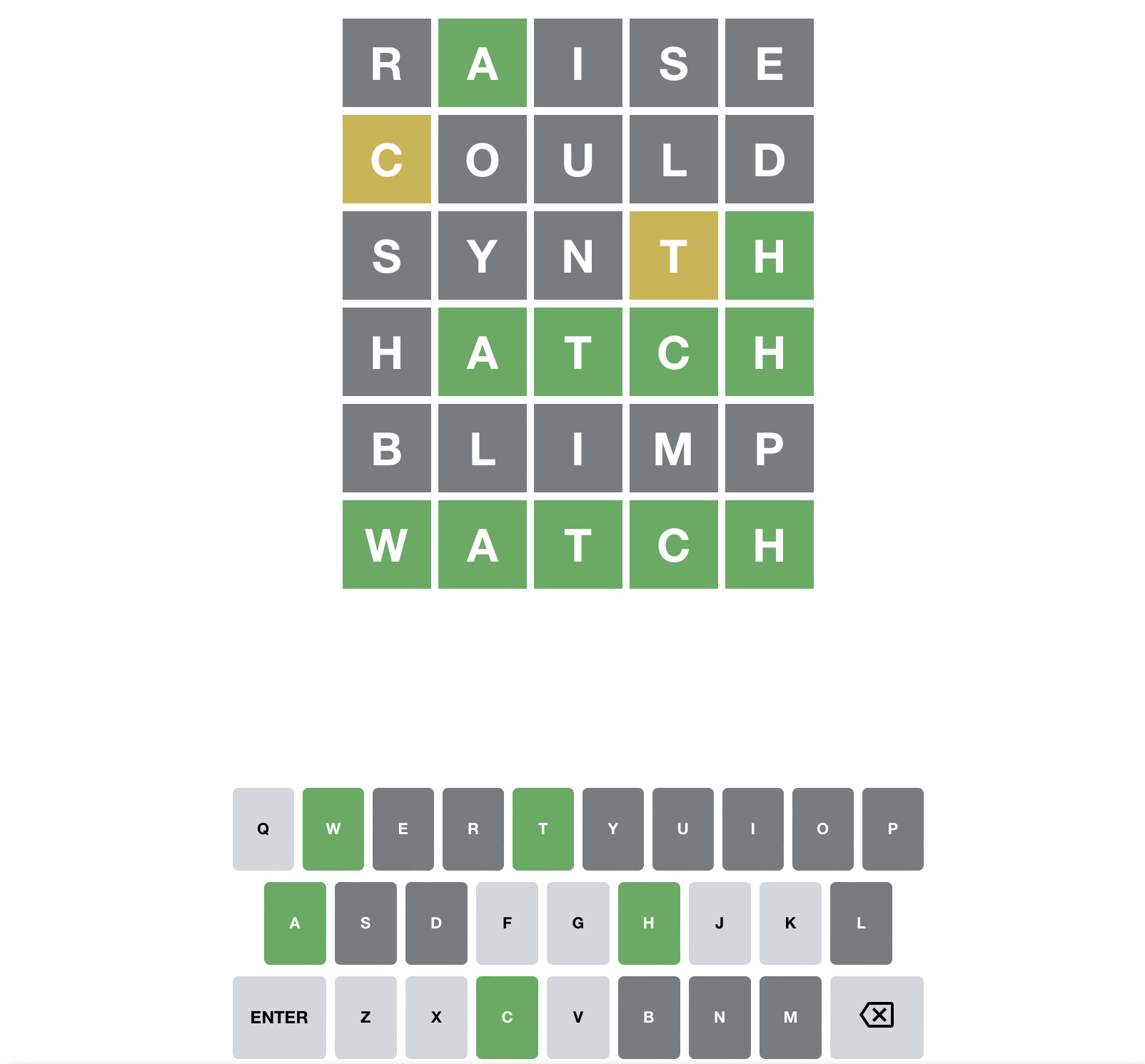
I've just had an email from one of our readers, David Tatam, who's showing that perhaps it's not that hard when you figure it out in the right way.
He's certainly right - and you can see that the key thing here was, when playing the game not in Hard Mode, that using a word to help you differentiate between the options is key.
More coming up on that from an expert shortly...
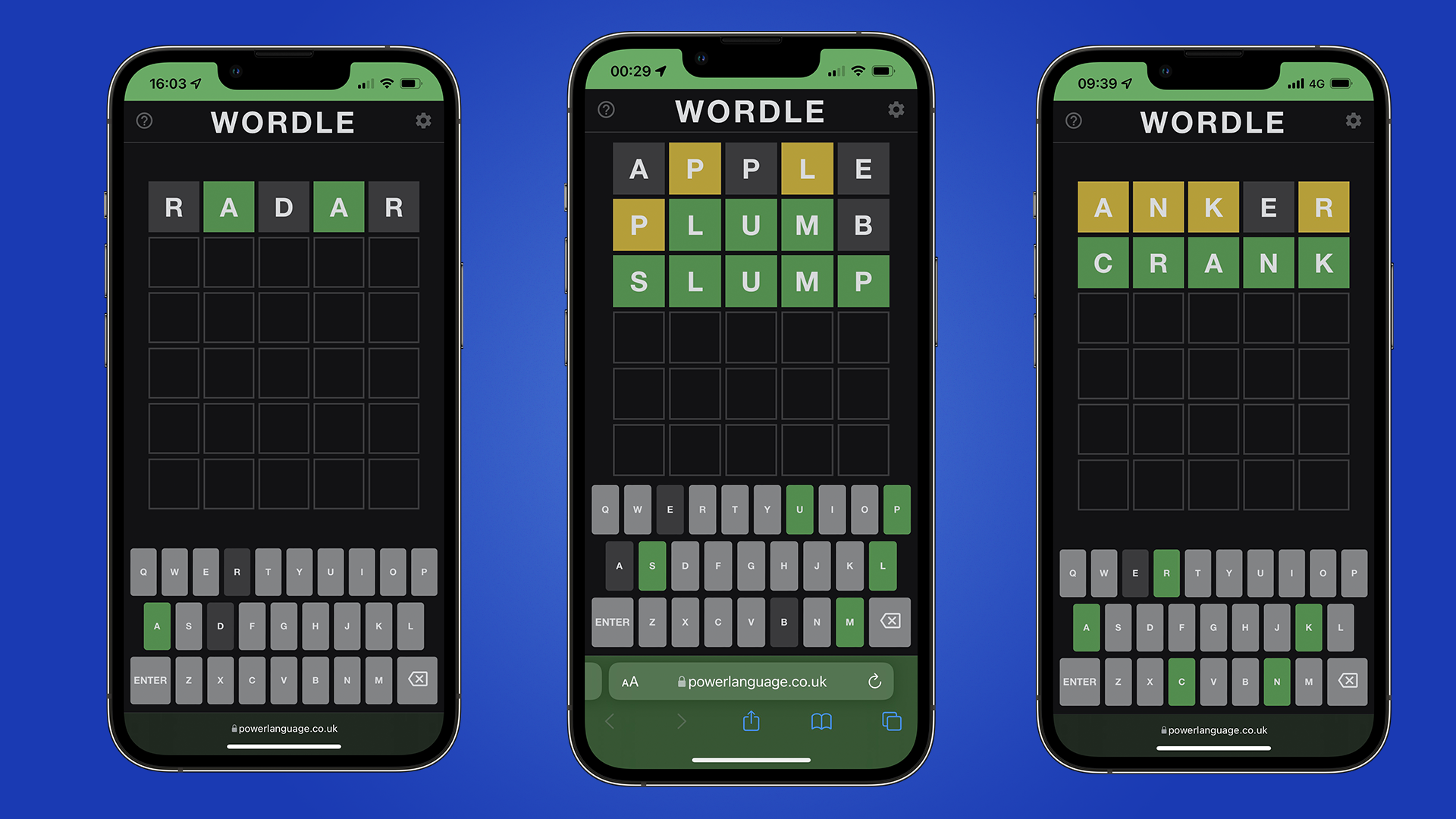
So, we've spoken to the Editor in Chief of Try Hard Guides, Shaun Savage, a guides site that publishes one of the Wordle solver tools that we link to in our main answer piece.
His site's tool monitors all the queries and patterns people are searching for, and the results are pretty illuminating for today's problems:
"We can definitely notice when people are struggling [with Wordle] because we'll see traffic spread out across a lot of options, but we will also see people looking for words and trying them in positions they don't belong.
"For example, today, a lot of folks are looking for words ending in "CT" as well as for words starting with "TA."
"We have also seen that people often miss the Wordle when there are a lot of possibilities for filling in the last letter, like _ATCH - batch, catch, latch, match, patch, and watch.
"Normally, we see traffic filter through to one or two searches quite heavily, but today, we are seeing it incredibly spread out, including on posts that are wrong.
"For example, the most trafficked Wordle post today is 'ending with CT', which is the wrong tack, [and] accounts for about 10%.
"We'd normally expect to see 50%+ of Wordle-related traffic on a single post but there are no true leaders today."
Savage also has a great hint for people not using Hard Mode (where you have to use the letters you've found) in how you can narrow down the possible letters left:
"One thing we recommend to folks is they should try a word that utilizes more consonants to fill in that last letter by simply eliminating some options, so instead of trying 'catch' try clamp, which would hit catch, latch, match, and patch together, eliminating many of those."
So we've been running some Twitter polls on how you handle your Wordle strategy - get involved and let us know how you Wordle:
What's your Wordle strategy for each game?March 11, 2022
Do you use a paper and paper to play Wordle?March 11, 2022
So, as it stands, 66% of our readers use the same start word each time (not me), and 90% of you never use a pen and paper to Wordle - which probably would have saved a few of us some heartache today...
So, we've been doing some more digging and spoken to an actual linguistics expert to discover why today's word is so hard.
We spoke to Dr Matthew Voice, an Assistant Professor in Applied Linguistics at the UK’s University of Warwick, to find out the science behind the struggle.
I'll warn you, you might need to read this through a couple of times (or not - I've proven today that I am Not Smart) - but the theory of the word structure is fascinating.
Here's a little clip:
"A further clue might have come from thinking about where within a word each letter is most likely to occur. 'W' on the whole is fairly uncommon, as you noted, but a corpus analysis of Project Gutenberg's digital library (several billion words!), gives 'W' as the 10th most common letter to start words in the corpus.
“Using Project Gutenberg data, it's interesting to note that _ATCH isn't listed as one of the most common quadrigrams in English overall, but the [same] data considers words of all lengths, rather than just the five letters Wordle is limited to. I don't know of any corpus exclusively composed of common 5 letter words, but it might be the case that _ATCH happens to be particularly productive for that length.”
So, there we go. This is a surprisingly hard puzzle and something that Wordle has exposed as one of the many quirks of the English language.
Long story short, I'm fine to have broken my streak.
Believable.
The child is definitely named Wordle 265 X pic.twitter.com/ynImMAv8G9March 11, 2022
Let's take a look at a couple of reader submissions here - one from a reader who was taking the 'Beavis' route, and one from Simon, who's gone for the more popular 'try the right letters to prevent the fail' methodology.
See if you can guess which is which... and which is most successful...
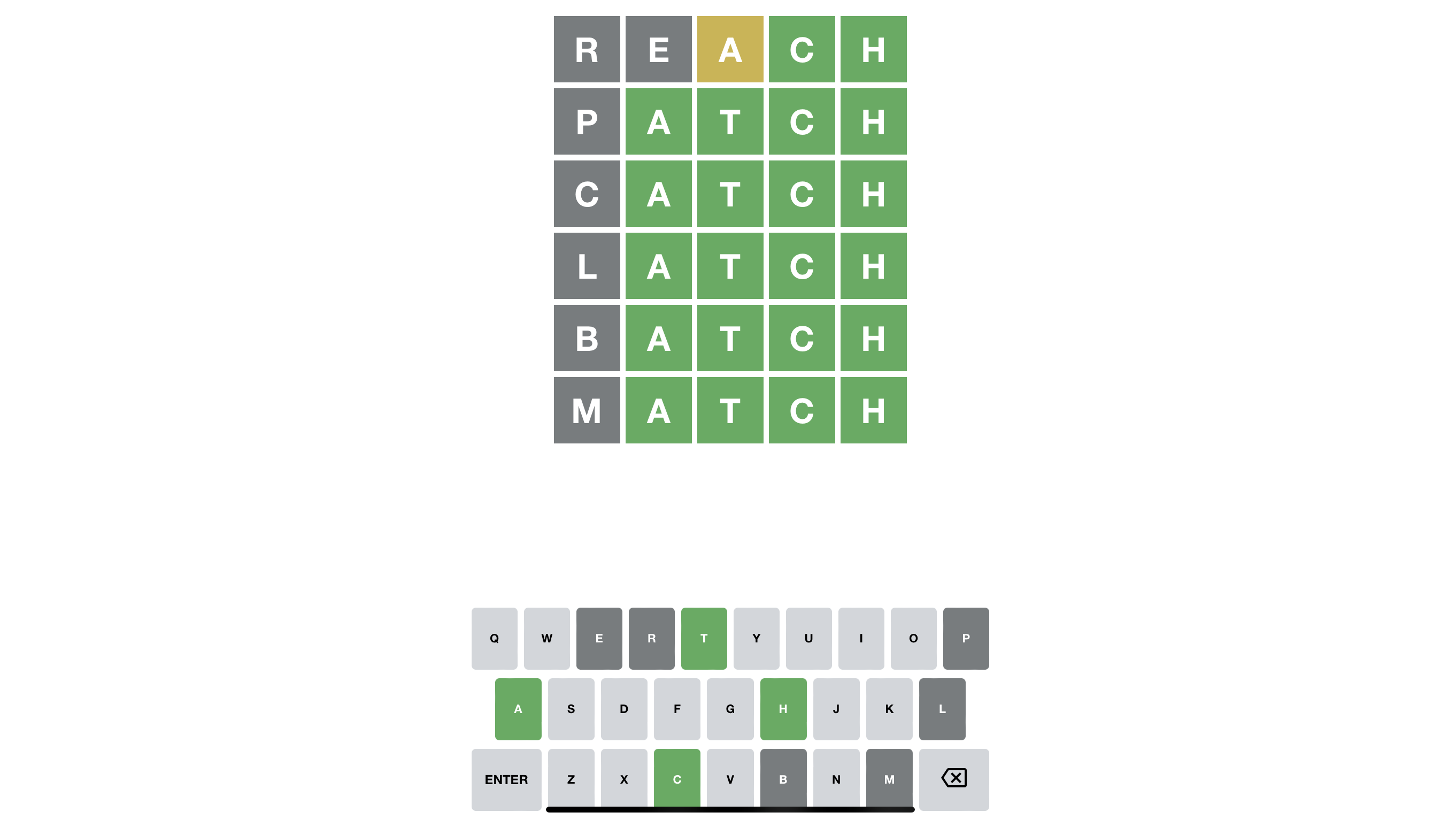
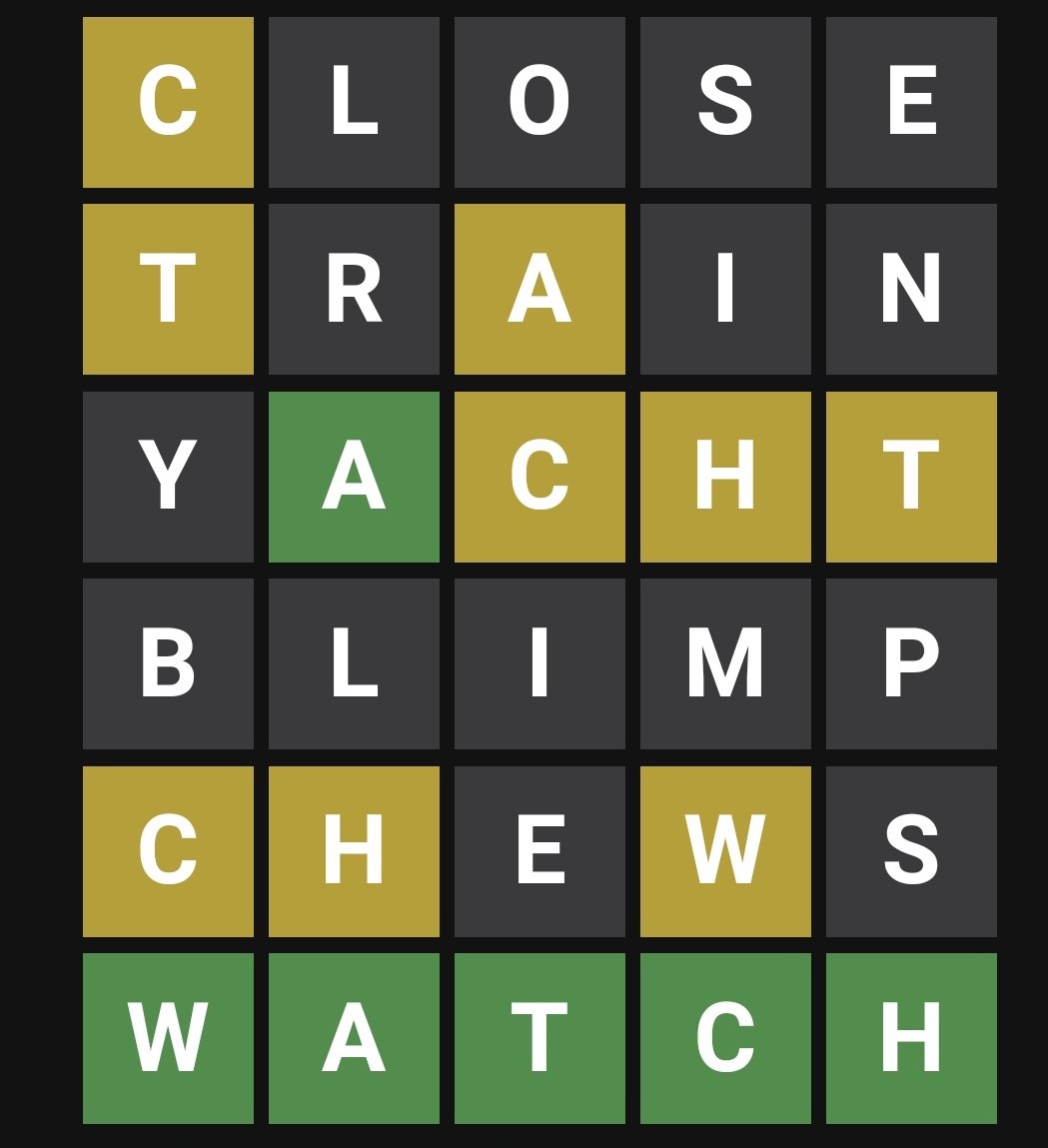

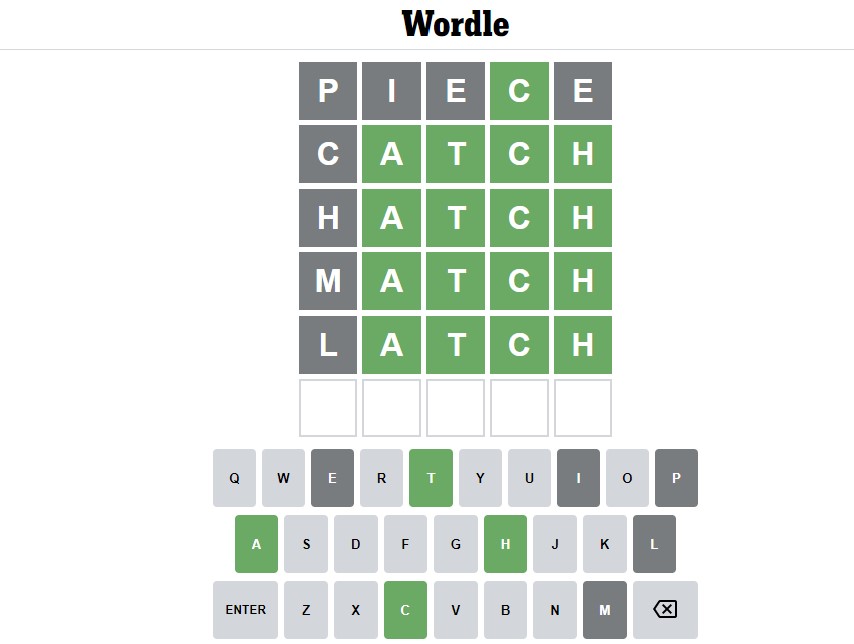
Not alone
Lance Ulanoff here. Our intrepid author and Wordler Gareth Beavis is not alone in this struggle. As US Editor in Chief, I wondered if the hidden word might be something more familiar to people across the pond in America.
Obviously, that wasn't the case. Even as more Wordle players came online in the US, they struggled just as mightily as everyone else around the World.
I didn't fail, and, after getting the "C" in the fifth letter spot, I saw only one possible word ending: "CH." Like others, I had "ATCH" on my second guess. I thought I had it in three. As you can see from my gameplay screen capture above, I tried almost everything except the right letter.
On Twitter, @Kayocosio showed me how he collected four out of five letters in the correct spots by turn four. However, knowing he needed a consonant and that there were six potential "_ATCH" guesses, he "wasted" a turn on a consonant-packed word, which helped him solve it in six.
How soon can we get back to words that don't have a bazillion single-letter variation cousins?
I burned a line using a consonant elimination word, since I thought that there were 6 potential options.Wordle 265 6/6🟨🟩⬜🟨⬜⬜🟩⬜⬜⬜⬜🟩⬜🟨🟩⬜🟩🟩🟩🟩⬜⬜⬜⬜⬜🟩🟩🟩🟩🟩March 11, 2022
At least we can laugh
The New York Times keeps telling us that Wordle is not getting harder. Those who struggled today believe otherwise. ABC News Journalist John Kapetaneas, lifted every struggling Wordler's spirits with a tweet that perfectly summarizes the difference between what The New York Times says and what Wordle does to us each day.
Also, I we think 'KHYBX" might really be a word.
NYT: No, we did not make Wordle harder. We promise. Also NYT: Today’s Wordle is KHYBX — which everyone knows is a popular 11th century Latin delicacy derived from quicksand extract. Duh.February 14, 2022
The only rule is that there are no rules
For every #Wordle265X on Twitter indicating they didn't figure out today's puzzle, there are many who solved it like it was any other day. Take this author's wife, who did it in three guesses and then looked at me like, "What's the big deal?"
Perhaps it's that this one word has tripped up so many Wordle champs and broke millions of Wordle streaks. Seriously, it's not the word that's hard here, it's really what our brains expected of the game and how that led many of us down a dark path of promising but ultimately incorrect guesses.
The truth is there is no universally bad or easy Wordle solution. Easy words can be hard for some and hard words or odd letter combinations come easy to others.
The knowledge does not make me any less annoyed at my wife who solved today's wordle in half the number of guesses it took me to get it.
My wife got it in 3Like it was No Big Deal https://t.co/Ruce5AN2TeMarch 11, 2022
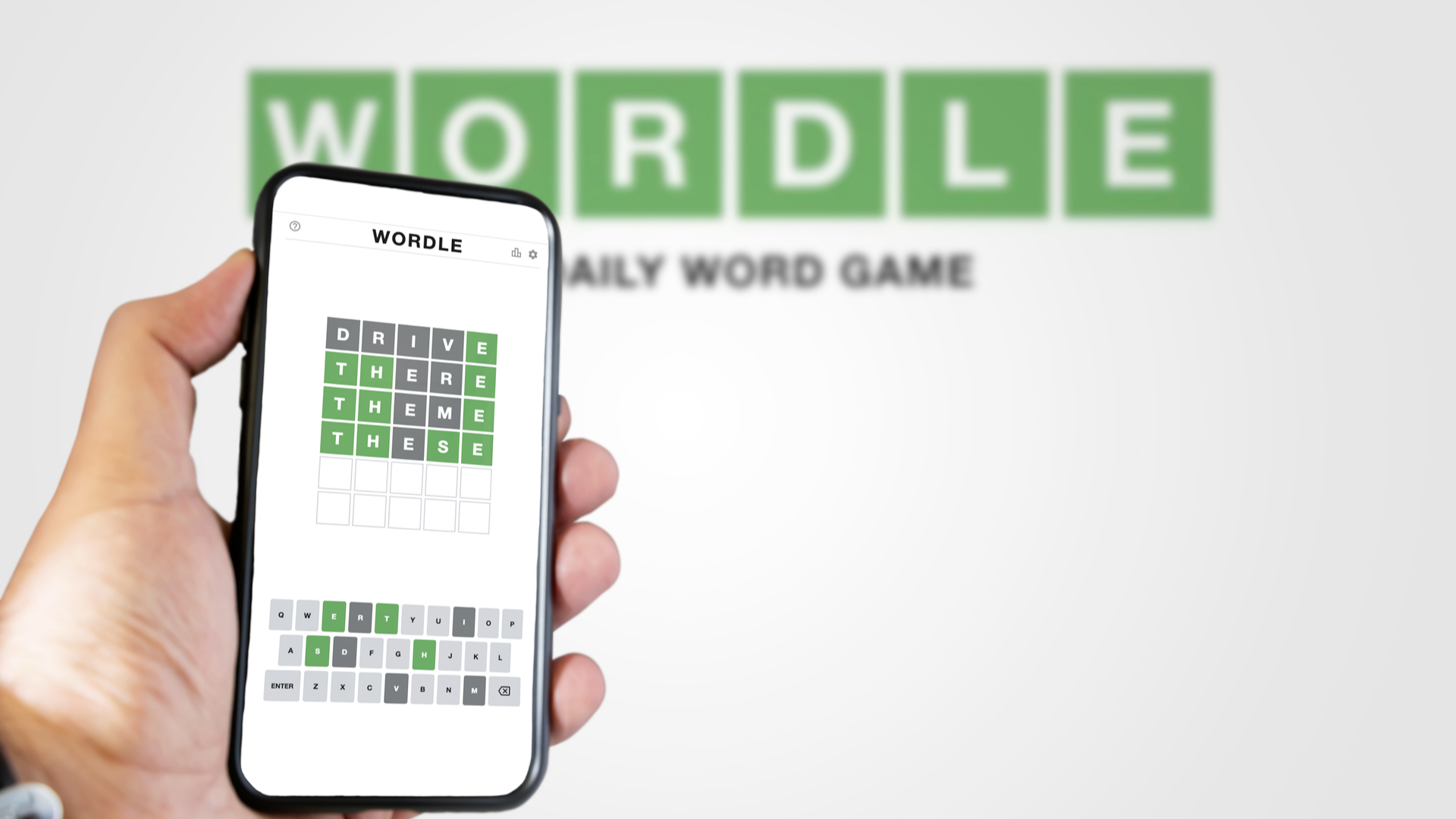
Right, we're heading into the next day in some timezones, so we'll say goodbye to this live blog for now - hopefully you got some lovely help from how to solve the puzzle today, and if not... well, maybe you could feel the frustration lifting in some small way.
I'll leave you with this - when talking to to Shaun Savage of Try Hard Games, the guides site that has its own Wordle solver, I asked him about the other tricky answer of late, when we had to solve AHEAD and it seemed to stump loads of people.
He gave some great insight, and hopefully this will help focus your brain for the future:
"Any word with double letters [letters appearing twice] seems like it is more likely to stump Wordle players, but it seems especially so when we are talking about vowels.
"Coupled with a word starting with a vowel and you have even more chance for confusion. AHEAD also contained two letters--H and D--that are less common, so the vowels were easy but the consonants were a bit harder, especially the H.
"Our users were more likely to know D was in the answer than H.
"We saw most players figure out letters A and E were in the puzzle, but the positioning was unclear.
"About 22% of Wordle traffic showed that players figured out the word ended in 'ead' and about 18% were thinking "hea" in the middle but it was getting the A in the beginning that seemed to be a place where people struggled."